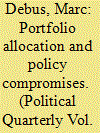|
|
|
Sort Order |
|
|
|
Items / Page
|
|
|
|
|
|
|
| Srl | Item |
| 1 |
ID:
094979


|
|
|
|
|
| Publication |
2010.
|
| Summary/Abstract |
This article analyses the extent to which national policies in the highly internationalised environmental sector are influenced by the policy preferences of political parties. The focus is on policy outputs rather than environmental performance as the central indicator of policy change. Based on a discussion of the relevant theoretical literature competing hypotheses are presented. For an empirical test, a dataset is used that includes information on the number of environmental policies adopted in 18 OECD countries at four points in time between 1970 and 2000. The results show that not only international integration, economic development and problem pressure, but also aspects of party politics, influence the number of policies adopted. The number of environmental measures increases if the governmental parties adopt more pro-environmentalist policy positions. This effect remains robust even when controlling for the institutional strength of governments, the left-right position of parties in government, the inclusion of an ecological or left-libertarian party inside the (coalition) government, and the presence of a portfolio that deals exclusively with environmental issues.
|
|
|
|
|
|
|
|
|
|
|
|
|
|
|
|
| 2 |
ID:
091084


|
|
|
|
|
| Publication |
2009.
|
| Summary/Abstract |
Various strands of literature in comparative politics regard governments as the only noteworthy initiators and mainsprings of legislative policy making in parliamentary democracies. Opposition activity in policy making is more often associated with the intention to prevent, rather than to shape, policy. Does this perception reflect real-life politics? To answer this question, this article discusses different arguments that link institutional and policy-related characteristics to the incentives and constraints of different government and parliamentary actors to initiate or co-sponsor legislative bills. More specifically, it relates policy-, office- and vote-related incentives, as well as institutional and resource constraints of legislative actors, to the likelihood that these actors will take the lead in legislative agenda-setting. These arguments are confronted with original data on the universe of all legislative bills in four parliamentary systems over one and a half decades. The article concludes that opposition and, in particular, bipartisan agenda-setting is indeed rare. Yet, in contrast to widely held maxims, it is neither absent nor spurious, but related to the allocation of power and the intensity of ideological conflict both within and between the (coalition) government and parliament.
|
|
|
|
|
|
|
|
|
|
|
|
|
|
|
|
| 3 |
ID:
084798


|
|
|
| 4 |
ID:
105874


|
|
|
|
|
| Publication |
2011.
|
| Summary/Abstract |
The question of 'who gets what?' is one of the most interesting issues in coalition politics. Research on portfolio allocation has thus far produced some clear-cut empirical findings: coalition parties receive ministerial posts in close proportion to the number of parliamentary seats they win. This article poses two simple questions: Why did the Conservatives and Liberal Democrats agree to form a coalition government and, secondly, did the process of portfolio allocation in the United Kingdom in 2010 reflect standard patterns of cabinet composition in modern democracies? In order to answer these questions, a content analysis of election manifestos is applied in this article in order to estimate the policy positions of the parties represented in the House of Commons. The results show that a coalition between the Tories and Lib Dems was indeed the optimal solution in the British coalition game in 2010. When applying the portfolio allocation model, it turns out that the Conservatives fulfilled the criteria of a 'strong party', implying that the Tories occupied the key position in the coalition game. On account of this pivotal role, they were ultimately able to capture the most important ministries in the new coalition government.
|
|
|
|
|
|
|
|
|
|
|
|
|
|
|
|
| 5 |
ID:
103990


|
|
|
|
|
| Publication |
2011.
|
| Summary/Abstract |
Ministerial portfolios are the most obvious payoffs for parties entering a governing coalition in parliamentary democracies. This renders the bargaining over portfolios an important phase of the government formation process. The question of 'who gets what, and why?' in terms of ministerial remits has not yet received much attention by coalition or party scholars. This article focuses on this qualitative aspect of portfolio allocation and uses a new comparative dataset to evaluate a number of hypotheses that can be drawn from the literature. The main hypothesis is that parties which, in their election manifestos, emphasise themes corresponding to the policy remit of specific cabinet portfolios are more likely to obtain control over these portfolios. The results show that policy saliency is indeed an important predictor of portfolio allocation in postwar Western European parliamentary democracies.
|
|
|
|
|
|
|
|
|
|
|
|
|
|
|
|
|
|
|
|
|